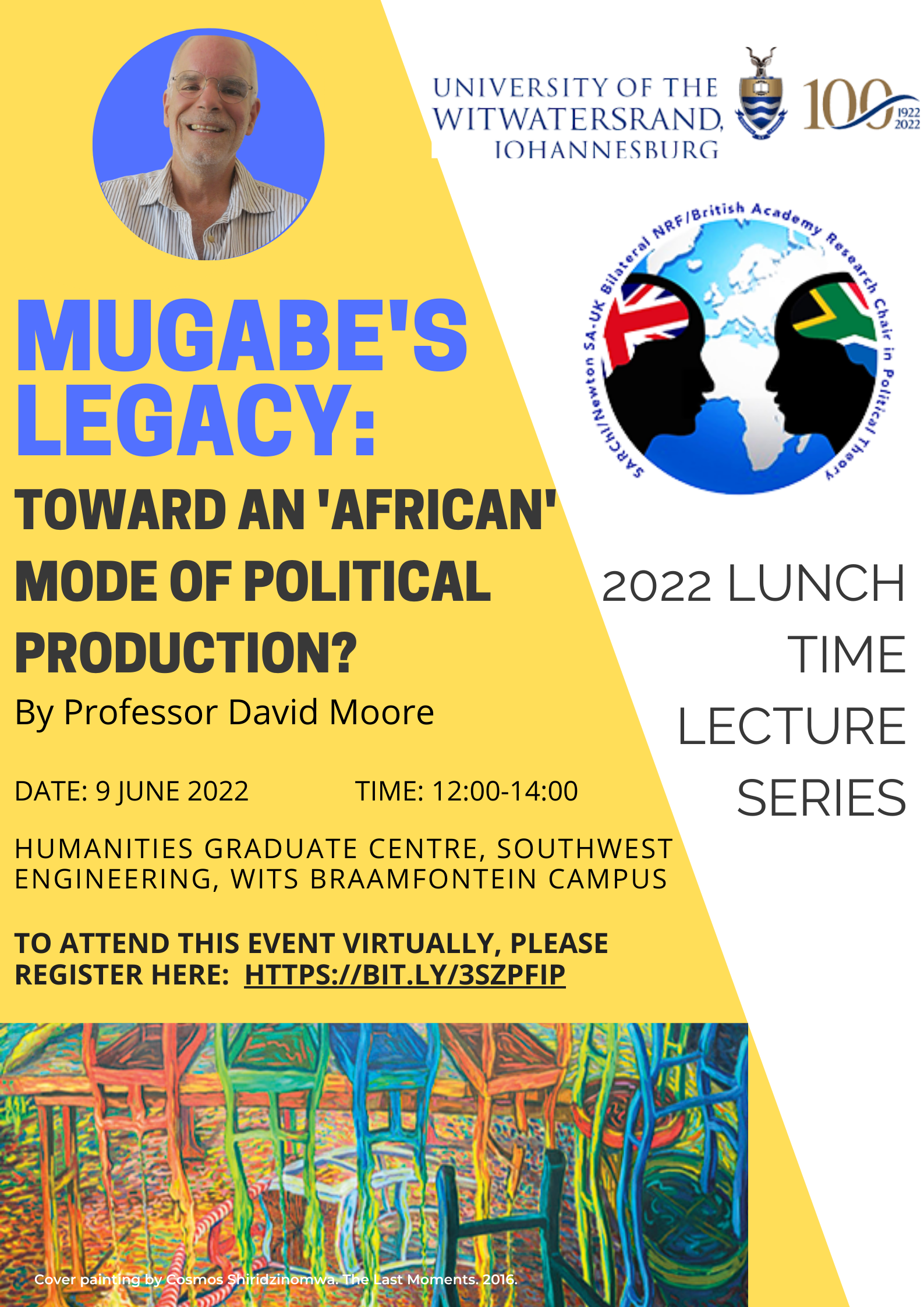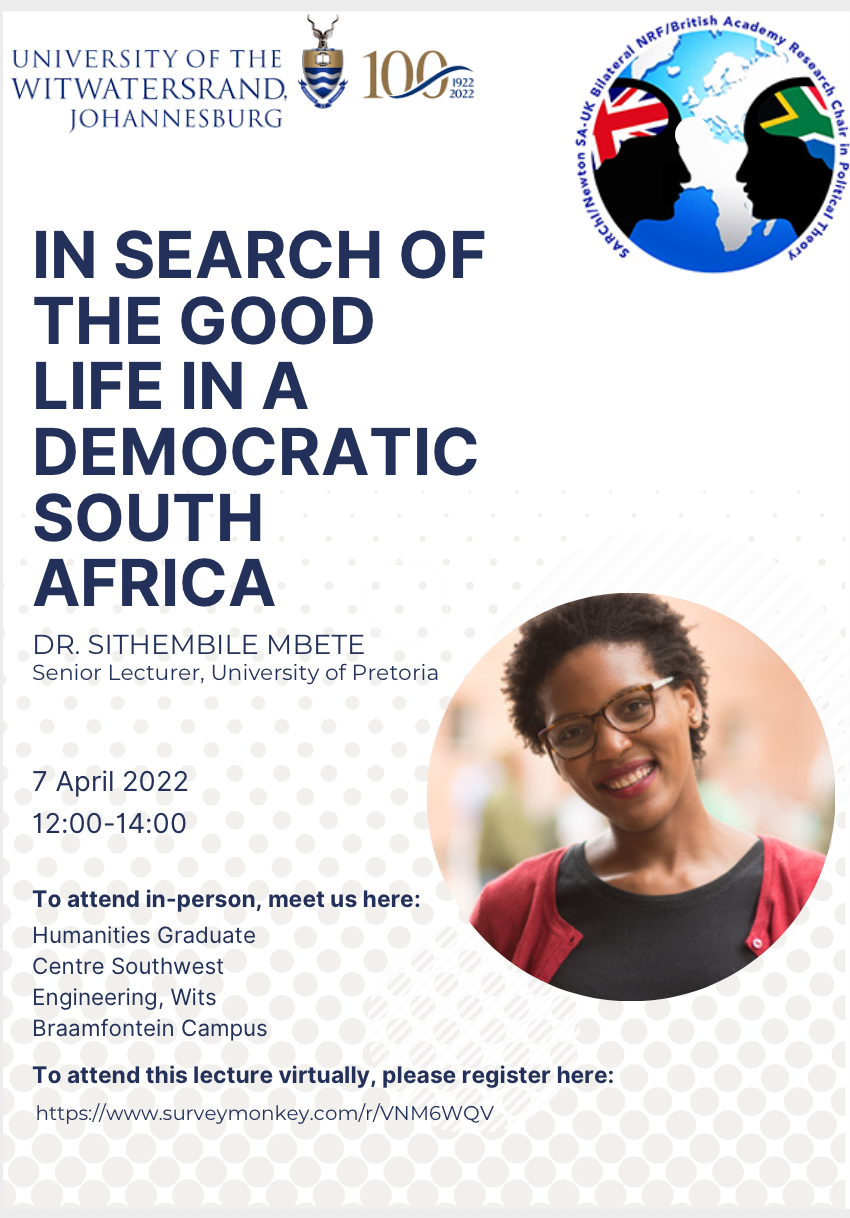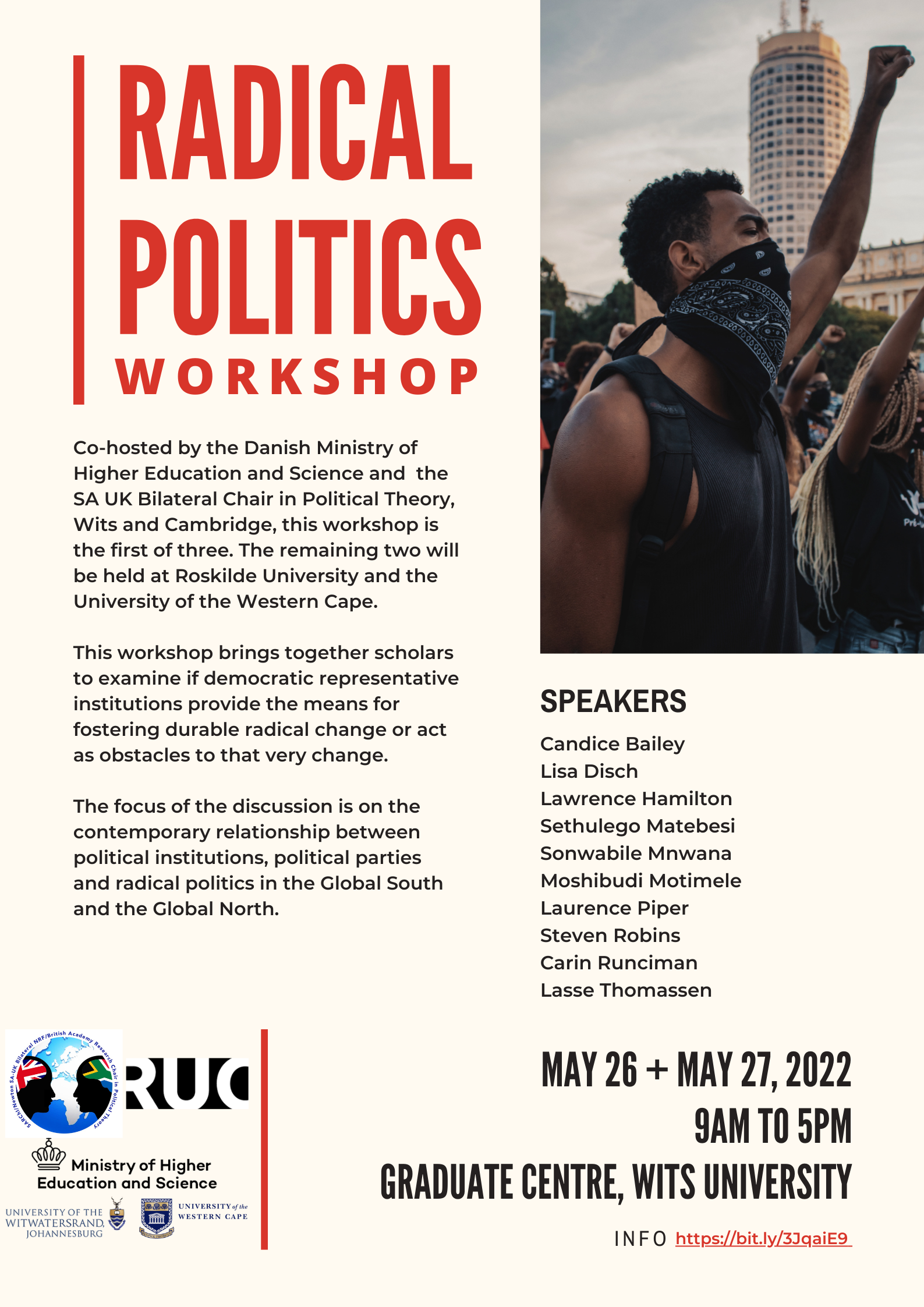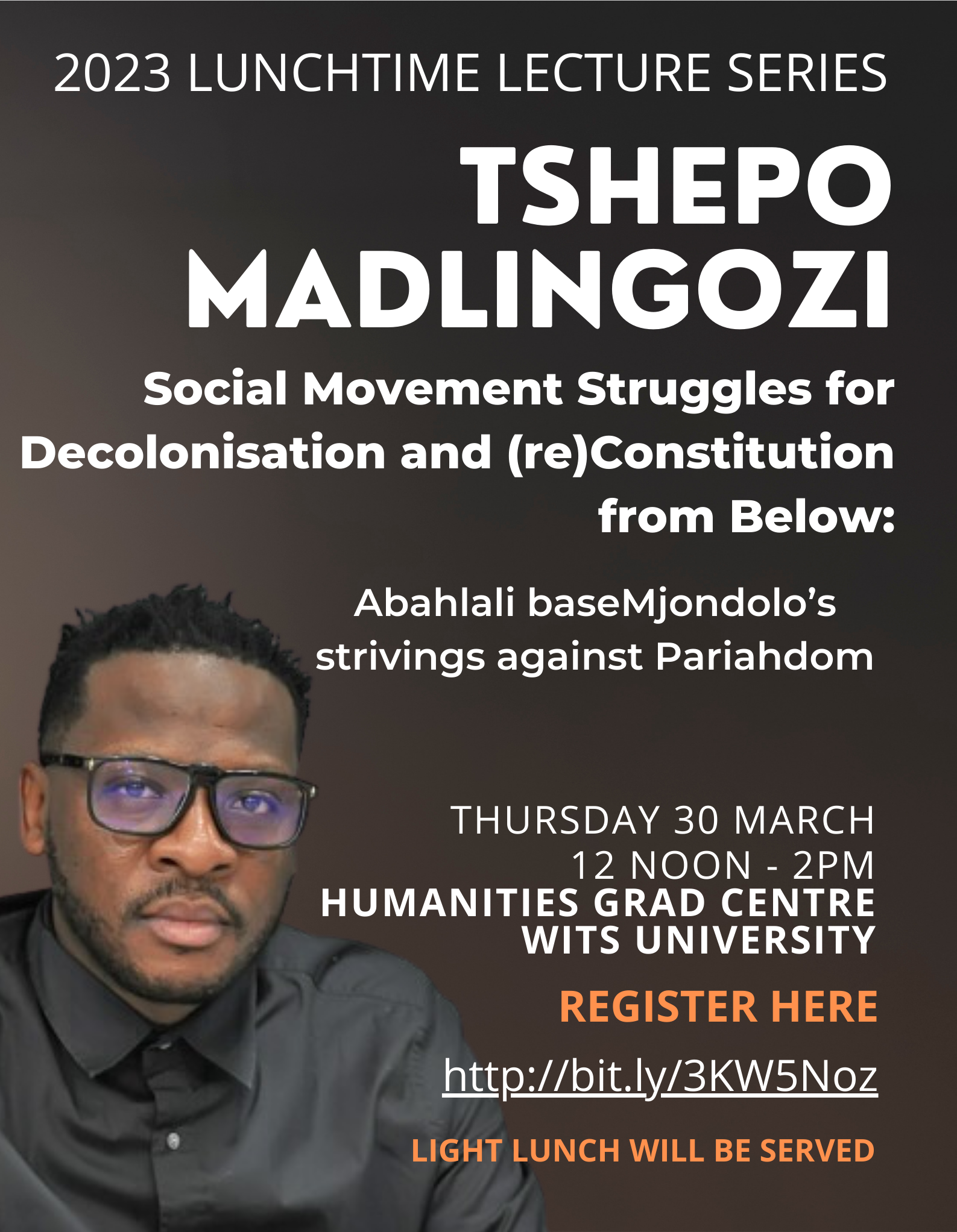-
Events 2023
Tshepo Madlingozi at the SA UK Lunchtime Lecture Series
Pariahdom is a constitutive and foundational settler colonial condition that confines indigenous people, historically enslaved people, and other oppressed people to lived experiences of unhomeliness, homelessness, rootlessness, namelessness, and ultimately worldlessness. Professor Madlingozi’s talk is part of the global south contribution to social movement scholarship with the aim of demonstrating that in historically settler colonial settings beyond classic claims for recognition and/or distribution, many movements are engaged in everyday decolonization struggles against pariahdom. Abahlali base Mjondolo (the Shack-dwellers Movement of South Africa) serves as a case study.
BIO: Professor Tshepo Madlingozi is the Director of the Centre for Applied Legal Studies at WITS University, and an Associate Professor at the School of Law of the same University where he teaches Social Justice and Human Rights. He holds Master’s degrees in both Law and Sociology, and he received his PhD degree from Birkbeck, University of London. He is a Research Associate at the Chair for Critical Studies in Higher Education at Nelson Mandela University, a Visiting Professor at the International Institute of Social Studies of Erasmus University Rotterdam, and a Faculty Member of the Vienna Master of Arts in Applied Human Rights.
-
Events 2022
Public Lectures 2022
Forthcoming Public Lecture
The SA-UK Bilateral Chair in Political Theory invites you to the third Lunchtime Seminar next week Thursday, the 23rd of June. Professor Aili Tripp will be presenting a talk, titled: Why African Autocracies Adopt Gender Reforms
You can attend this seminar in person (lunch will be served) or online, by registering here: https://bit.ly/3mILj5m
Date: 23 June 2022
Time: 12h00-14h00
Venue: Humanities Graduate Centre, Southwest Engineering Building, Wits Braamfontein Campus.

Abstract:
The presentation explains why authoritarian countries in Africa promote women as leaders. It explains under what conditions women’s leadership is instrumentalized to legitimate an autocratic regime and what are the consequences when the inclusion of women in politics is used to enhance the longevity of an autocratic regime. The presentation looks at these processes in the context of the introduction of multipartyism in the early 1990s, the end of major conflicts in Africa, and changing international gender norms. The project, which will result in a book and several articles, is based on crossnational research in Africa and over 150 in-depth interviews and content analysis in Mauritania, Namibia, Botswana, Uganda, Zimbabwe, Rwanda, and Morocco.
Prof David Moore (University of Johannesburg) | Date: 09 June 2022 | Time: 12h00
Title: Mugabe's Legacy
Venue: Humanities Graduate Centre Southwest Engineering, Wits Braamfontein Campus

Abstract:
This seminar is an attempt to combine two things. First, it is an introduction to my book Mugabe’s Legacy: Coups, Conspiracies, and the Conceits of Power in Zimbabwe, which was supposed to be available by June 2 but will be out by the middle of the month. Second, it will discuss whether or not a relatively empirical historical analysis of one man’s pursuit of power and the consequences thereof in one social formation (‘Zimbabwe’) raises enough theoretical questions to enable considering the possibility that there can be an ‘African mode of political production’. Can such an approach be both general (universal?), and specific (non-teleological, counter-developmental-hegemonic, and grounded?) enough to assist the study of this continent’s history and political economy? Can it merge the fundamental changes in the global political economy that have and do bear so much on the continent with its particular political and economic patterns of power and accumulation, such that we can produce workable propositions for the study of African countries that are unique but far from ‘exceptional’?
Remaining 2022 Public Lectures
Dr Aili Tripp (University of Wisconsin-Madison) | Date : 23 June 2022 | Title: Why African Autocracies Adopt Gender Reforms
Dr Shruti Kapila (Cambridge University) | Date: 25 August 2022 | Title: On Violence: The End of Empire and the Importance of India for Global Political Thought
Prof Diego von Vacano (Texas A&M University) | Date: TBC | Title: "The Rise of Populism in the Americas: From Trump and Sanders to Morales and Bolsonaro".
Past 2022 Events

In search of the good life in a democratic South Africa by Dr Sithembile Mbete, Senior Lecturer, University of Pretoria
Date &Time: 7 April 2022 12:00-14:00
The talk is a hybrid event and will be in person and virtual.
To attend be at the Humanities Graduate Centre Southwest Engineering, Wits Braamfontein Campus at 12 noon.
To attend this lecture virtually, please register here:https://www.surveymonkey.com/r/VNM6WQ
More about Dr Mbete:
Dr. Sithembile Mbete is a lecturer in the Department of Political Sciences at the University of Pretoria where she lectures international relations and South African politics. She is also an Associate Fellow of the Centre for Governance Innovation (GovInn) at the University of Pretoria.
She comments frequently in the media on a range of issues in South African politics and international politics. She has appeared in local and international media including eNCA, SABC, Kaya FM, BBC, NPR, the Mail and Guardian, The Financial Times and the New York Times.
Sithembile joined the University of Pretoria from The Presidency of South Africa where she was a researcher in the secretariat of the National Planning Commission. She contributed to the drafting of the National Development Plan in the areas of public service reform, anti-corruption policy and community safety. Prior to this she worked as a political researcher at IDASA (Institute for Democracy in Africa) where she was responsible for Parliamentary monitoring and political analysis. While at Idasa she monitored the parliamentary deliberations on the Protection of State Information Bill (POSIB), commenting on and writing about the bill in the media. She served on the provincial and national working groups of the Right2Know Campaign and helped coordinate activism against the legislation.
Radical Politics Workshop 26 & 27 May 2022

For more info: https://bit.ly/3JqaiE9
Radical Politics beyond or through Representative Institutions?
Workshop
University of Witwatersrand, 26-27 May 2022Keynote Speakers:
Prof Lisa Disch ( University of Michigan))
Prof Lasse Thomassen (Queen Mary University of London)
Thursday 26 May
9:00-9:30: Introduction (Lasse Thomassen)9:30-10:30: Lawrence Hamilton: Representative democracy against oligarchy
10:30-11:30: Candice Bailey: Does PAIA have the potential to be an instrument for
radical politics in South Africa?11:30-12:30: Lunch
12:30-13:30: Steven Robins and Laurin Baumgardt: Civic activism and indigenous
identity politics up against the Amazon Empire at the tip of Africa13:30-14:30: Sethulego Matebesi: Local government: A conduit for transactional
activism in South Africa14:30-15:00: Tea Break
15:00-16:15: Keynote Address: Lisa Disch: Radical politics through representative
democracy
Friday 27 May
9:30-10:30: Laurence Piper: Death of the Citizen: Democratic weakness, informality
and contestation10:30-11:30: Moshibudi Motimele: What to teach the native? A provocation for the
South African Black Public Humanities11:30-12:30: Lunch
12:30-13:30: Carin Runciman: Radical reform or co-optation of the labour
movement? Reflecting on the trade union movement post-apartheid13:30-14:30: Sonwabile Mnwana: Mining, land and local politics of distribution in
rural South Africa14:30-15:00: Tea Break
15:00-16:15: Keynote Address: Lasse Thomassen: The people goes to The Capitol:
democracy and populism á la Jacques Derrida
Funded by Danish Ministry of Higher Education and Science and the SA-UK Bilateral
Research Chair in Political Theory -
Events 2020
Dr Shruti Kapila (Cambridge University) | Date: 19 March 2020 | Title: Global Intellectual History as Decolonization and the Indian Age
Dr Sithembile Mbethe (University of Pretoria) | Date: 21 May 2020
Prof David Moore (University of Johannesburg) | Date: 20 August 2020 | Title: (On) Writing (On) Mugabe
Prof Diego von Vacano (Texas A&M University) | Date: 15 October 2020 | Title: "The Rise of Populism in the Americas: From Trump and Sanders to Morales and Bolsonaro".
-
Events 2019
Thursday 06 June 2019 | Professor Terrell Carver (University of Bristol, UK) | Where is Eurocentrism? Re-thinking colonialism and re-reading Marx
Abstract
Marx remains central to theorizing postcoloniality and decolonization. However, in Said’s Orientalism Marx and Marxisms were charged with Eurocentrism. Further charges of ethnocentricism, nationalism, racism, colonialism have arisen in works of commentary. Commentary as a genre operates through tropes that enforce a discourse of certainty. That certainty is projected from commentator to subject, a formerly living individual. That individual is conflated with an oeuvre, and depicted through tropes of passivity and hermeticism. Thus commentary creates a subject-author who speaks dogmatically and in isolation from agent-driven political activity. The present article applies this genre-critique to Kevin B. Anderson, Marx at the Margins (updated 2016). In contradistinction to Anderson’s moralizing and judgemental certainties, the present article acknowledges exploratory, uncertain and indeterminate subjectivities, both in re-reader and in subject-author. From that perspective it explores Marx’s political interventions of 1846-47 that argue the centrality of Caribbean slavery to the globalizing violence of capitalist industrialization.
Thursday 02 May 2019 | Professor Sabelo Ndlovu-Gatsheni (Unisa)|Reflections on African Struggles for Epistemic Freedom and the Challenges of Decolonizing the University
Professor Ndlovu-Gatsheni heads up the Archie Mafeje Research Institute (AMRI) and is a Full Professor in the Department of Development Studies at the University of South Africa in Pretoria, South Africa. He is the author of The Ndebele Nation: Reflections on Hegemony, Memory and Historiography (Amsterdam & Pretoria: Rozenburg Publishers & UNISA Press, 2009); Do ‘Zimbabweans’ Exist? Trajectories of Nationalism, National Identity Formation & Crisis in A Postcolonial State, (Oxford: Peter Lang International Academic Publishers, 2009); Empire, Global Coloniality and African Subjectivity (New York & Oxford: Berghahn Books, June 2013); and Coloniality of Power in Postcolonial Africa: Myths of Decolonization(Dakar: CODESRIA Books, 2013 in press).
Professor Laurence Piper (University of the Western Cape) | Democracy Disconnected in the Urban South: From rule by the many to many forms of rule
Laurence Piper is Professor of Political Studies at the University of the Western Cape, and visiting Professor at the University West, Sweden. His research interests centre on the theory and practice of city politics and governance, with a current focus on informality and informal politics. A graduate of Cambridge (2000), Prof Piper is former President of the South African Association of Political Studies (SAAPS) and a member of the Academy of Science of South Africa (ASSAF). His most recently book, co-authored with Dr Fiona Anciano, is Democracy Disconnected: Participation and Governance in a City of the South, Routledge, 2019.
Thursday 28 February 2019 | Professor Paulin Hountondji (Benin) | African Philosophy Today
Professor Hountondji comes to Wits courtesy of the NRF/British Academy SA-UK Bilateral Research Chair in Political Theory and WISER’s Mapping African Futures Seminar series.
Abstract:
African philosophy is not just a collective worldview supposedly shared by all Africans though they may be themselves unaware of it. Instead African philosophy is philosophy done by Africans. The critique of ethno-philosophy as formulated some fifty years ago draws attention not only to the existence of individual thinkers in Africa but also to their full intellectual responsibility while discussing with and sometimes opposing one another. Beyond this critique however it remains obvious that African cultures including African languages, religions, rituals and other domains of collective heritage are based on a set of common assumptions as is also the case in other societies and cultures. These assumptions however should by no means be termed African philosophy or philosophies. Instead philosophy begins at the very moment when the individual takes a stand for or against this intellectual heritage.
Paulin Hountondji is currently Director of the African Centre for Advanced Studies (Porto-Novo, Bénin). He received his PhD in philosphy in 1970 from the École normale supérieure in Paris. His many published works include African Philosophy: Myth and Reality (1996) and The Struggle for Meaning: Reflections on Philosophy, Culture, and Democracy in Africa (2002). -
Events 2018
Thursday 23 August 2018 | Dr Aaron Kamugisha (The University of the West Indies) | "Beyond Coloniality: Caribbean Freedom in an age of disenchantment".
Abstract:
The contemporary Anglophone Caribbean—an area of experience that so many of its dispossessed citizens have given their lives and hearts to in the hope of social transformation—is in a state of tragedy and crisis, destroyed and corrupted by a postcolonial malaise wedded to neocolonialism. The story about the Caribbean’s retreat from a moment striving for revolutionary coherence in the 1970s to the decline and lethargy of our time is often linked to the advent of global neoliberalism, a global story in which we are all enmeshed. My claim, though, is that the term neoliberalismflattens the complexity of the Caribbean’s current moment. Rather, in the Caribbean we see an amalgam of neocolonialism, postcolonial elite domination, andneoliberalism, which have undermined the conditions of possibility for any kind of social democracy—far less the democratic-socialist experiments of a generation ago. We are thus left with anti-worker states seduced and secured by client politics and a lurking ruthless authoritarianism. That is our political moment in the Caribbean and the terrain of struggle of my forthcoming book, Beyond Coloniality: Citizenship and Freedom in the Caribbean Intellectual Tradition.
Beyond Coloniality is an extended meditation on Caribbean thought and freedom at the beginning of the 21st century and a profound rejection of the postindependence social and political organization of the Anglophone Caribbean and its contentment with neocolonial arrangements of power. I provide readings of two towering figures of the Caribbean intellectual tradition, C. L. R. James and Sylvia Wynter, and their quest for human freedom beyond coloniality. Ultimately, I urge the Caribbean to recall and reconsider the radicalism of its most distinguished 20th-century thinkers in order to fashion an answer to the conundrums of the present, and imagine a future beyond neocolonialism.
Dr Manjeet Ramgotra (University of London) | 'The languages of republicanism: self-rule and the public thing'
Abstract:
India’s anti-colonial struggle for independence and founding of a sovereign democratic republic combined the languages of swaraj, self-rule, and res publica, the public thing. The Sanskrit, swaraj refers to the individual and collective selves which are transformed (through processes of decolonization) to become citizen and independent state. The Latin, res publica refers to that which belongs to the public, including the constitution and the public space in which a people come together in an agreement in law to determine their collective lives. This paper examines how these languages about self and public come together in the creation of India’s postcolonial republic.
Prof Grant Parker (Stanford University) | 'Writing Resistance. Making sense of Roman Literatures'
Abstract:
A number of uprisings against Roman imperial power can be reconstructed historically. Yet it is surprisingly difficult to develop a richer understanding the nature of resistance within the sprawling empire. What implications does this have for Roman ideas about freedom? This talk is an attempt to reframe the idea of resistance in the empire (ca. 1st century BC to 5th century AD), drawing on a wide range of texts of Roman imperials texts.
PAULO CONCEIÇÄO JOÄO FARIA (Faculdade de Ciências Sociais, Universidade Agostinho Neto) | The Iron Fist and the People: Two Ways of Analysing Africa’s Paradoxes
ABSTRACT:
African states reflect complex past and present political trajectories. This can be understood as entailing four interconnected dynamics and processes: first, a mix of hasty decolonization processes; second, the battleground of fierce proxy wars; third, ideological struggles for the balance of power: and fourth, the rule of perennial autocratic systems sustained by domestic, international, state and non-state actors. On the one hand, this has deterred the blossoming of civic rights and rule by law, and on the other hand, fed into narratives about the paradox of plenty, social imbalances, and institutional decay as undermining the struggle of African states to guarantee basic political, social and economic rights to citizens. Yet, despite enduring power structures that often interlace with repressive impulses within existing regimes, an emerging pattern of change seems to be taking place across the continent. It is hard, however, to foresee whether the efforts to reform the AU will help to address the gulf between power-holders and the people or fall prey to a complex web of vested interests. This paper attempts to tackle the challenges and opportunities facing the continent.
-
Events 2017
Biko’s Combat Breath in Deep Time | Tendayi Sithole (26 October 2017)
Abstract:
Tendayi Sithole is Associate Professor in the Department of Political Sciences, University of South Africa where he teaches African Politics. He holds a doctorate in African Politics which was based on Achille Mbembe’s political thought from the same university. Sithole is the founding member of Africa Decolonial Research Network and the executive council member of South African Association of Political Studies. Thematic areas of his research are black radical thought, decolonial critical theory, Africana existential phenomenology, public intellectuals, and literary studies. His forthcoming book Steve Biko: Decolonial Meditations will be published by Lexington Books. He just completed a book project provisionally titled Meditations in Black: Essays from the Limits of Being which is a study on black thinkers as thinkers and not biographical subjects. He is currently doing research on the political thought of Sylvia Wynter for a book project
Democracy and the Poor: Notes for a Radical Theory of Democracy | Andreas Kalyvas (27 July 2017)
Abstract:
Andreas Kalyvas is Associate Professor in the Department of Politics at The New School for Social Research. He received his PhD and MA in Political Science at Columbia University and a BA in Political Science and Public Administration from the National and Kapodistrian University in Athens, Greece. Before joining the New School, he taught at Columbia University and the University of Michigan. He has been a visiting research professor at the University of Barcelona, Spain, and has also taught in Germany, Poland, and South Africa.
Professor Kalyvas’s work focuses on democratic theory and the history of political thought from ancient Greek and Roman to modern and contemporary continental political theory. His research interests are situated in the intersection of politics, history, and jurisprudence with a strong emphasis on the relationship between popular sovereignty and constituent power; resistance, sedition, and revolutionary breaks; the norm and the exception; emergency rule; citizenship, cosmopolitanism, and migration. He is currently completing a book manuscript entitled, “Legalizing Tyranny: Republicanism, Dictatorship, and the Enemy Within.”
Kalyvas is co-director of the Columbia University Seminar on Political and Social Thought.
Comparative Political Theory and global challenges | Dr Vasileios Syros (8 June 2017)
Abstract:
Dr Syros is a Senior Research Fellow at the Academy of Finland and also serves as KNAW/Royal Netherlands Academy of Arts & Sciences Visiting Professor at Radboud University Nijmegen. His teaching and research interests focus on Comparative Political Theory and the history of Christian/Latin, Jewish, and Islamic political thought.
Dr Syros is the principal investigator for the research project “Political Power in the European and Islamic Worlds” (2014–18). He has taught previously at Stanford University, McGill University, The University of Chicago, and the École Pratique des Hautes Études (Paris) and has received fellowships from Columbia University, the University of Pennsylvania, Princeton University, and the Royal Society of Edinburgh.
The session will be chaired by the British Academy Research Chair in Political Theory, Professor Lawrence Hamilton.
Democratic Competition: The Good, the Bad, and the Ugly | Professor Ian Shapiro (16 March 2017)
Abstract:
Sterling Professor of Political Science Ian Shapiro was invited to speak by NRF/British Academy Research Chair in Political Theory, Professor Lawrence Hamilton.
Shapiro is also the Henry R. Luce Director of the MacMillan Centre for International and Area Studies at Yale University.
His lecture Democratic Competition: The Good, the Bad, and the Ugly’ was an evaluation of different democratic arrangements in light of the elections and referenda of 2016. Shapiro argues that recent trends to decentralize decision-making and the governance of political parties in the name of enhanced democratic control have been self-defeating, and he proposes appropriate remedies.
Shapiro has written widely and influentially on democracy, justice, and the methods of social inquiry. He was born in South Africa but has been teaching in the Yale Political Science Department since 1984.
He is a fellow of the American Academy of Arts and Sciences and the American Philosophical Society, and a member of the Council on Foreign Relations. He is a past fellow of the Carnegie Corporation, the Guggenheim Foundation, and the Center for Advanced Study in the Behavioral Sciences. He has held visiting appointments in Cape Town, Tokyo and Oxford.



